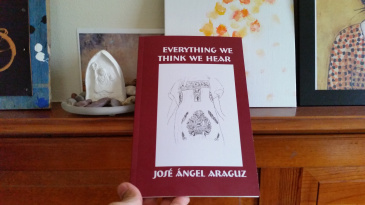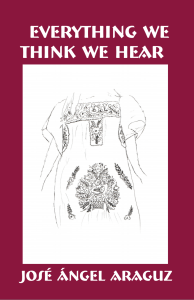Jose Angel Araguz's Blog, page 44
December 30, 2015
* new book review up at the Volta Blog

Just a quick post to share my latest book review for The Volta Blog. This review (which can be read here) is my take on A Third Instance, a collection of three chapbooks by Rosa Alcalá, Craig Watson, and Elisabeth Whitehead published by Instance Press.
See you Friday!
Jose


December 25, 2015
* happy crow-lidays via claribel alegria
Ars Poetica – Claribel Alegria
I,
poet by trade,
condemned so many times
to be a crow,
would never change places
with the Venus de Milo:
while she reigns in the Louvre
and dies of boredom
and collects dust
I discover the sun
each morning
and amid valleys
volcanoes
and debris of war
I catch sight of the promised land.
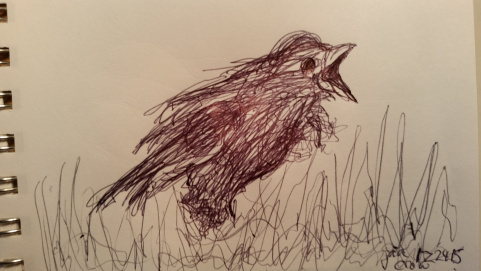
Keeping it short this week with this favorite from Claribel Alegria. The directness of the lyric, how it dives straight into its metaphor and subverts the jab of “crow” into something powerful, never fails to give me hope and animo.
Also, any excuse to sketch up a crow, no?
I wish everyone a safe holiday!
Stay tuned for the End of Year Reading next week in which I’ll share audio excerpts from Everything We Think We Hear (available on Amazon )!
Happy discovering!
José


December 18, 2015
* salvaging with kay ryan
Salvage – Kay Ryan
The wreck
is a fact.
The worst
has happened.
The salvage trucks
back in and
the salvage men
begin to sort
and stack,
whistling as
they work.
Thanks be
to god—again—
for extractable elements
which are not
carriers of pain,
for this periodic
table at which
the self-taught
salvagers disassemble
the unthinkable
to the unthought.
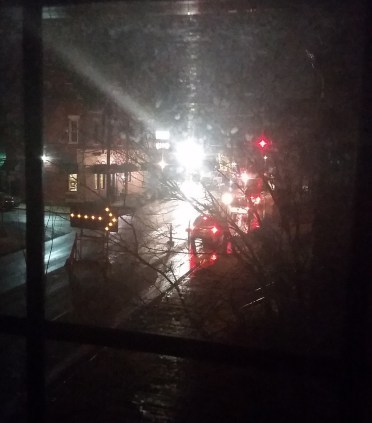
What I love about the lyric above by Kay Ryan is how much complication it holds in its short lines. Between casual observation and straight fact, there are worlds living side by side. The “unthinkable” happens, then others get to “whistling as/they work.” Poems like these show the necessary work of poets and their asbestos gloves, able to hold volatile and conflicting materials via imagery and metaphor, and make from them a flash and foundation of understanding.
***
Ani and I have been going through our own process of “salvaging” what we can from the “unthinkable” for about a week now. Last Friday evening, round-the-clock construction began at the intersection near us. Above is a photo taken around midnight Saturday. That’s a spotlight lighting the way for the poor guys out there doing their job. There was a brief respite from Sunday night til Tuesday morning, when work started up again. By Tuesday afternoon, we had this scene:

Count’em: that’s three heavy-duty machines moving around, rattling the apartment building, making us feel like dinosaurs are roving outside our window. This stage of construction is only from 8:30am til 5:30pm each day. At night, steel plates are lined up along the street which sound like thunder every time a car passes over them. THOSE we hear at night.
Each of us is coping as best we can. Ani’s begun coming up with stories about “Mr. Scoopy” and I keep wondering if these guys will get the holiday off next week. We’re told the work should be done by Christmas Eve. We’ll be in “salvaging” mode til then.
***
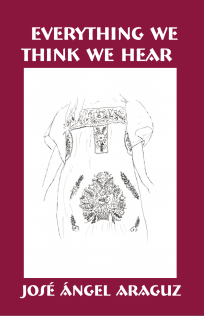
Speaking of things under construction, things have cleared up regarding my new book, Everything We Think We Hear. It is officially available on Amazon (again)!
I’ll keep bookending the Friday posts with book info throughout December. I’m happy to report that I have booked a few readings in my hometown Corpus Christi, TX in March. Also, I have some news about things coming up in Spring 2016. More details on all of this soon!
Happy salvaging!
Jose


December 11, 2015
* existing with gisela kraft & an update
five-story house in laleli – Gisela Kraft
one lies in rags on the street
and his stomach is empty
and he wishes for death
one sits with friends at tea and backgammon
and his mind is empty
and he wishes for death
one sits in a straight-backed chair at a desk
and his bank account is empty
and he wishes for death
one lies in bed staring out to sea
and the place next to him in bed is empty
and he wishes for death
one flies back with food in its beak
and its nest is empty
and only this one says
we should give it another try
(trans. Laura Leichum)
This short lyric has quickly become a favorite of mine in the past few weeks. I’m charmed by the way the seemingly simple refrain quickly enters into allegory. The repetitions of “empty” and “death” build up an atmosphere of dejection and set up the turn at the end of the poem. The impersonal and non-specific nature of “one” as an address allows for the final stanza’s change in perspective; something “flies” in the heart of the reader and defies the preceding stanzas of emptiness and death, and gives further impetus to exist. There’s also a structural charm to the poem in the way the “five-story house” is played out in the five stanzas of the poem.
***
It has been a week since the official release of my collection Everything We Think We Hear. Since then, I have been humbled and moved by the warm reception and good wishes people have shown the new book. Thank you to all who have shown interest and bought the book!
After some minor issues, the book is available for order on Amazon!
As part of a partly superstitious and partly practical (or so I tell myself) process, I went ahead and ordered myself a copy. Here’s a pic that shows that my little book does indeed exist:
This copy is going straight to mom in Texas. I’ll make sure to post an update here when I receive my own copies for sale.
Happy existing!
José


December 4, 2015
* a revisit, prose poem thoughts, & thanks
Footnote – James Schuyler
The bluet is a small flower, creamy-throated, that grows in patches in New England lawns. The bluet (French pronunciation) is the shaggy cornflower, growing wild in France. “The Bluet” is a poem I wrote. The Bluet is a painting of Joan Mitchell’s. The thick blue runs and holds. All of them, broken-up pieces of sky, hard sky, soft sky. Today I’ll take Joan’s giant vision, running and holding, staring you down with beauty. Though I need reject none. Bluet. “Bloo-ay.”

A few weeks ago, I wrote a post about James Schuyler’s “The Bluet” which he references in the prose poem above. I just discovered the above poem in a prose poem anthology I’m reading for my exams. I marvel at how much of Schuyler’s human fascination comes through in both his poem and “footnote.” The added information here, both of pronunciation (I’ve been saying it “blue-it” as in I really blew it with that pronunciation) and of Mitchell’s artwork, adds layers to Schuyler’s ongoing meditation on the bluet. Both in lyric and in prose, the flower is turned over, “running and holding” for both Schuyler and reader.
Earlier this week, I posted about the release of my collection Everything We Think We Hear (available for purchase here and here). In discussing the project with friend and poet John Sibley Williams on Facebook, I found myself realizing something about the ambition of the project in its turns between prose poetry and microfiction. At one point, I wrote:
So much of what we do in a poem, prose or lineated, is about what’s unspoken, while microfiction lends itself to more narrative completion. The most apt metaphor I can think of at the moment is those jeans and hoodies that come pre-scuffed up and torn, a narrative holding but frayed.
There’s a great quote from Robert Frost about poetry books where he says that if a book of poems has 25 poems, the book as a whole should stand as the 26th. This quote has long been an inspiration behind the strategies I use in putting a manuscript together. This quote also points to the way projects can have pockets of the same idea, varying shades of the same color. In the spirit of Schuyler’s takes on the bluet, I hope variations in form and intent work out an added layer to the reading experience in Everything We Think We Hear.
Thank you to all who have reached out with kind words and good wishes on the recent publication! Thank you to everyone who has bought a copy or plans on doing so (you totally should)! And lastly, thank you to John for getting my brain thinking :)
Happy bluet-ing!
Jose
P.S. After all that, it’s still a painting command in my head: “blue it!”


December 2, 2015
* new collection released!!!
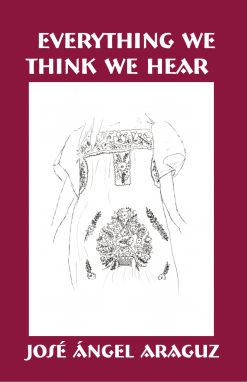
I’m happy to announce that my new collection Everything We Think We Hear is officially available for purchase here.
Copies run for $9.95 + shipping and handling.
As I’ve mentioned here, this project brings the prose poem and flash fiction structure of my chapbook Reasons (not) to Dance and takes it in a more personal direction, adds a little more guacamole and South Texas to my usual rhetorical and imagistic leanings.
Here are what some of my favorite writers had to say about the project:
“What is the meaning beyond memory’s hauntings? How does one survive the multi-faceted self fashioned from such meanings? Poet José Ángel Araguz’ unflinching collection, Everything We Think We Hear, considers these questions from all angles and gives us answers as adamantine and brilliant as the prose poems he has fashioned in his questing.”
Sarah Cortéz, Councilor, Texas Institute of Letters, Author of Cold Blue Steel
“José Ángel Araguz balances the beauty and agony of a man siphoning love from beer bottles, sparse mother-son conversations, a stern Tía’s throw, and the weathered memories of an absent father. This collection, where a boy who couldn’t dream becomes a man “making communion with all he knows,” insists you gaze on lo raro, the sour-pickled and scattered parts of a soul who refuses to ignore the song of the broken even when surrounded by splendor. “
Peggy Robles-Alvarado, author of Homenaje a las guerreras
“In José Angel Araguz’s collection, Everything We Think We Hear, todo se vale, everything goes! This book plays with our senses and forces us to consider what we think we hear, what we think we are reading. A fierce voice that shouts often and whispers now and then the many truths of life in South Texas. The poetic prose pieces startle the senses with rich images that linger in the mind like memorable dreams. Read these pieces and come away transformed.”
Norma E. Cantú, author of Canícula
Anyone interested in a copy for review, I can make a PDF available. Feel free to contact me: thefridayinfluence@gmail.com
Thank you to Sarah, Peggy, and Norma for their wonderful words of support for this project!
Special thanks as well to Roberto Cabello-Argandoña of Floricanto Press for working with me during this process!
See you Friday!
Jose


* new work up at tahoma literary review
Just a quick note to announce the release of Tahoma Literary Review’s fifth issue which includes my piece “Spiderman Hitches a Ride.” The good folks at TLR also allowed me to write a blog post giving some background to this piece: On ‘Spiderman…’
This issue also features a phenomenal lineup, including work from Kenzie Allen, Martha Silano, Lito Velázquez, and James White. A online copy of the issue can be found here, along with instructions on how to order a print copy and how to download a free e-reader edition.
Special thanks to editors Kelly Davio, Joe Ponepinto, and Yi Shun Lai for all the hard work that went into putting together an awesome issue!
See you Friday!
Jose


November 27, 2015
* sunsetting with gwendolyn brooks
A Sunset of the City – Gwendolyn Brooks
Already I am no longer looked at with lechery or love.
My daughters and sons have put me away with marbles and dolls,
Are gone from the house.
My husband and lovers are pleasant or somewhat polite
And night is night.
It is a real chill out,
The genuine thing.
I am not deceived, I do not think it is still summer
Because sun stays and birds continue to sing.
It is summer-gone that I see, it is summer-gone.
The sweet flowers indrying and dying down,
The grasses forgetting their blaze and consenting to brown.
It is a real chill out. The fall crisp comes
I am aware there is winter to heed.
There is no warm house
That is fitted with my need.
I am cold in this cold house this house
Whose washed echoes are tremulous down lost halls.
I am a woman, and dusty, standing among new affairs.
I am a woman who hurries through her prayers.
Tin intimations of a quiet core to be my
Desert and my dear relief
Come: there shall be such islanding from grief,
And small communion with the master shore.
Twang they. And I incline this ear to tin,
Consult a dual dilemma. Whether to dry
In humming pallor or to leap and die.
Somebody muffed it?? Somebody wanted to joke.
One of the things that always moves me about Gwendolyn Brooks’ work is her ability to strike emotional chords down to the level of language. This is done in the above poem subtly at the beginning, as the word “gone” is in one stanza and “summer” in the next, only to be brought together in the speaker’s meditation as the compound “summer-gone.” Having this moment build up gradually allows the reader to be in the same space as the speaker, so that when “summer-gone” is repeated in one line, it is an inevitability.
A similar things happens in the line “I am cold in this cold house this house,” where the repetition of “cold” and “house” moves them from adjective and noun into the realm of an personal lexicon for this speaker. This repetition is a kind of nuanced linguistical desire and defiance that mirrors the conceptual themes of the poem, the speaker owning the experience through statement and restatement. When, later in the same stanza, the speaker says:
I am a woman, and dusty, standing among new affairs.
I am a woman who hurries through her prayers.
I can’t help but marvel at the juxtaposition of the longer, more punctuated line against the shorter line that follows. Here, sentence structure mirrors the speaker’s state of mind, assessing and taking in the “affairs” around her in one line, and feeling a need to “hurry” in the next. This kind of attention to the line fills Brooks’ work with lessons for both the heart and mind.
***
As promised, here is a sneak peek at the cover of my forthcoming collection Everything We Think We Hear, set to be released next week on December 1st. Stay tuned for updates and ordering information. For now, check out “Don’t Look Now I Might Be Mexican” (with audio!) published in Blue Mesa Review which will appear in the collection.
I’ve also been revamping the site a bit, making changes to make things more navigable. The more notable changes include the layout of the “poems” tab, which is updated to include some more recent publications, as well as the creation of tabs for “prose” and “tanka & co.” Under “prose,” there are links to book reviews I’ve done as well as posts for the Cincinnati Review blog and writing I’ve done on specific poems for journals (like this one for the Tahoma Literary Review – On “Spiderman Hitches a Ride” – the piece itself to be released next Tuesday). Under “tanka & co.” there are links to my publications in various Japanese poetic forms including this sequence of 39 tanka in Atlas Poetica (PDF). I’ll be working on gussying up the other tabs as time goes on.
Happy sunsetting!
José


November 20, 2015
* new anthology & everything cover art
Oaring – Sam Roderick Roxas-Chua
In a shallow bay, my father is slumped
inside a black raft, arms flung over each side,
fingers flicking the water. I touch the ripple
of sunset and I want to be his fingerprints
and index his lolled years—carry his melody
of back and forth, unlearn the sway
of push and pushing.
Today I wrap the oars in silk,
leave the telephone receiver pendulous
over the oak table where he taught me
to write my name in English—
that round eddy where forgotten things
appear and disappear like those beetles
I tied to strings during a storm.
I remember that table carved from a bend
in my father’s house, how it listened
to the chorus of wings outside our window—
oaring the sky for forgiveness, oaring the sky
for another way home.
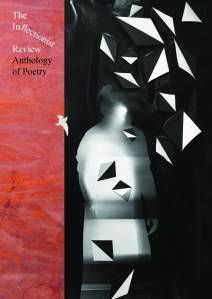
* new anthology *
The poem above is just one of many fine poems in the newly released Inflectionist Review Anthology of Poetry. The way in which the word “oar” is used throughout the poem is a great example of what the editors had in mind by “inflectionism.” As defined on their site, “Inflecting suggests grasping what has come before and redefining it, refocusing it, placing it upon a different point in the arc thereby changing its trajectory.” The last two lines “oaring the sky for/another way home” become for me not just a metaphor for the experience of the speaker but also for the experience of writing, which can be seen via the poem as another kind of “oaring.”
The Inflectionist Review Anthology of Poetry features all the poems from issues 1-4 as well as an interview and feature of Distinguished Poet, Courtney Druz along with artwork from Anna Daedalus and Kerry Davis.
I’m delighted to have nine of my own poems in the anthology, including some newer work in the Naos persona. Here is “Naos Explains Memory,” which the editors of the Inflectionist Review were generous enough to nominate for a Pushcart Prize:
Naos Explains Memory – José Angel Araguz
Like gradual blindness: each day, more and more, a mix of less and less.
What you do see, you say remember. What filters through: a voice, car lights,
the ends of a dress. Singular and graphic. A strong whiskey.
A root you cannot shake from your body. The color of the last moon.
In a city you do not remember leaving.
The Inflectionist Review Anthology of Poetry can be purchased here (and make sure to check out the review’s submission guidelines here).
Congratulations to editors John Sibley Williams and A. Molotkov for putting together such a fine anthology!
***
The countdown to the December 1st release of my full-length collection, Everything We Think We Hear, continues. Since I shared the IR Anthology cover I thought I would share the artwork that will be featured on the cover:
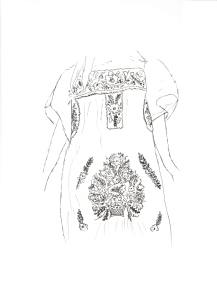 This piece by artist Andrea Schreiber features the kind of dress my mother wore to work at Rosita’s on Baldwin back when I was a kid. As we get closer to the date I plan on sharing the full cover. I did, however, want to share the artwork alone as it is its own special creation. Here are links to the mom-related “Raro” recently published in Compose Journal as well as to The Story Behind “Raro” feature on the piece.
This piece by artist Andrea Schreiber features the kind of dress my mother wore to work at Rosita’s on Baldwin back when I was a kid. As we get closer to the date I plan on sharing the full cover. I did, however, want to share the artwork alone as it is its own special creation. Here are links to the mom-related “Raro” recently published in Compose Journal as well as to The Story Behind “Raro” feature on the piece.
Happy inflectioning!
José


November 13, 2015
* solituding with james schuyler
One of the most moving things about being a poet and sharing the work I do has been hearing feedback from people. I remember years ago after performing at a poetry slam, I had a woman come up to me and quote a line from one of the poems I’d read: “Why are men only honest during the slow songs?” Then she hugged me and said, That’s it, that’s exactly it.
Another time I was working at a coffee shop and had posted some poems (my own and by others) on the community board in celebration of National Poetry Month. It was a lovely surprise to hand off a latte to a young man as he smiled and said: “Solitude feels like fire sometimes.” Did you write that? That’s a good line.
My reaction in both situations was a mix of smiling and mumbling, eventually landing on a thank you.
In the three years of running this blog, I have been moved to similar moments of smiling and mumbling gratitude by comments made here, Facebook, Twitter, and email by those of you kind enough to read and reach out. While writing and reading may be solitary acts, there is a special kind of communion that happens in those moments of sharing lines and insights. Thank you for making me feel heard!
This week’s poem – “The Bluet” by James Schuyler – connects this type of communion via poetry with that available in the natural world. In those moments of reading a line and considering it, we read with the kind of attention and listening that “breaks/[us] up.”

* quaking *
The Bluet – James Schuyler
And is it stamina
that unseasonably freaks
forth a bluet, a
Quaker lady, by
the lake? So small,
a drop of sky that
splashed and held,
four-petaled, creamy
in its throat. The woods
around were brown,
the air crisp as a
Carr’s table water
biscuit and smelt of
cider. There were frost
apples on the trees in
the field below the house.
The pond was still, then
broke into a ripple.
The hills, the leaves that
have not yet fallen
are deep and oriental
rug colors. Brown leaves
in the woods set off
gray trunks of trees.
But that bluet was
the focus of it all: last
spring, next spring, what
does it matter? Unexpected
as a tear when someone
reads a poem you wrote
for him: “It’s this line
here.” That bluet breaks
me up, tiny spring flower
late, late in dour October.
***
The countdown to the December 1st release of my full-length collection, Everything We Think We Hear, continues. Here is a link to my poem “Letter to Rainer Maria Rilke from NYC” published in The Acentos Review in 2010. It’s the piece where the “solitude” line quoted above appears.
Happy solituding!
José




